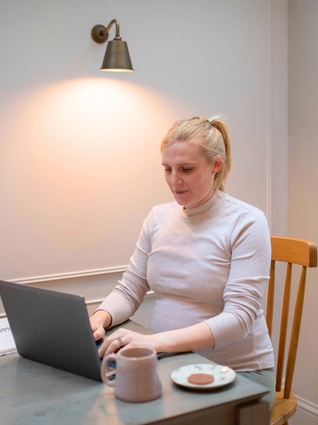
- Home
- Advice Hub
- Pregnancy
- Preparing For Arrival
- Maternity Rights At Work
Maternity rights at work
Your rights at work start well before your baby is born, so it's helpful to know exactly what you’re entitled to.
Telling Your Employer
You might not choose to tell your employer about your pregnancy straight away, but you'll need to do so at least 15 weeks before your baby is due. Make sure to put it in writing – there are some good online templates you can use to help you – and indicate when you'll be planning to begin your statutory maternity leave - you can change the date later if you need to.
Working in a Safe Environment During Pregnancy
Once you've notified your employer that you're pregnant, they have a legal obligation to carry out a risk assessment on your job to make sure it's safe for you. This might involve obvious risks like working with hazardous chemicals, lifting heavy loads, working in extreme temperatures, or standing for long periods of time. It will also take into account things like long working hours and shift work.
Your employer must take steps to remove any risks or offer you suitable alternative work (with no less favourable terms and conditions). If the risk can't be avoided and no suitable alternative work is available, your employer must give you time off on full pay.
What About Antenatal Appointments?
You’re entitled to paid time off for any antenatal appointments during working hours, including antenatal classes and relaxation sessions if that's what your doctor or midwife has advised. Your employer may ask for evidence of your appointment after the first one, but they cannot refuse you paid time off for these essential checks.
Maternity Leave
Currently, all pregnant employees are entitled to Statutory Maternity Leave of up to 52 weeks. This is made up of 26 weeks of Ordinary Maternity Leave and 26 weeks of Additional Maternity Leave.
Once you've notified your employer of your pregnancy, they must then write to you within 28 days to confirm your return date. You'll need to give your employer at least eight weeks’ notice if you wish to change your return date.
You can start your maternity leave up to 11 weeks before your baby is due. Alternatively, you could work right up until your due date and take your full leave entitlement after the baby is born if you prefer to have more time with your baby.
You don’t have to take the full 52 weeks of maternity leave, but legally, you must take at least 2 weeks off after the birth (or 4 weeks if you work in a factory).
You and your partner might also be eligible for Shared Parental Leave, so it's worth checking your options.
Maternity Pay
If you've been working for your employer for at least 26 continuous weeks by the 15th week before your baby is due, and you earn enough to pay National Insurance contributions, you’ll qualify for Statutory Maternity Pay.
Statutory Maternity Pay is payable for up to 39 weeks, and you'll receive:
- 90% of your salary for the first 6 weeks.
- £187.18 per week (or 90% of your weekly earnings, whichever is lower) for the next 33 weeks.
Maternity Allowance
If you don’t qualify for Statutory Maternity Pay because you're self-employed or haven't worked for your employer for long enough, you may be entitled to Maternity Allowance instead. You can claim this for a maximum of 39 weeks, This means if you take the full 52 weeks Statutory Maternity Leave, your final 13 weeks will be unpaid. To qualify, you must have been employed or self-employed for 26 of the 66 weeks before your baby is due.
As of April 2024, you may receive up to £184.03 per week in Maternity Allowance or 90% of your average weekly earnings (whichever is less), depending on your eligibility.
Does Maternity Leave Affect Other Employment Benefits?
When you are on maternity leave, you're still eligible for any benefits you’d usually receive if you were working. That includes things like pension contributions, private healthcare, and accruing annual holiday as usual.
Keeping in Touch Days
During maternity leave, you can agree with your employer to have up to 10 "keeping in touch" days. These days can be used for training, team events, or any form of work, and they might make it easier to transition back into work after your leave. You can work up to 10 days during your maternity leave without losing your Statutory Maternity Pay.
What Are My Rights Once My Additional Maternity Leave is Over?
At the end of Additional Maternity Leave, you're entitled to return to your original job. If this isn’t possible, your employer must offer you a suitable alternative job with the same or better terms and conditions. If they can’t offer you a suitable role, you may be entitled to redundancy pay.
If you're unsure of your exact entitlements or need more guidance, you can find further information on the GOV.UK website or the Working Families website.


